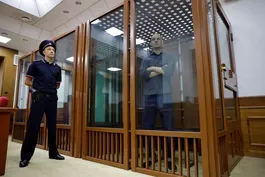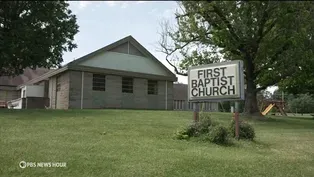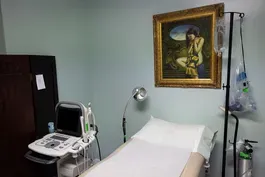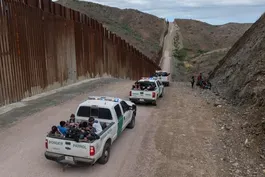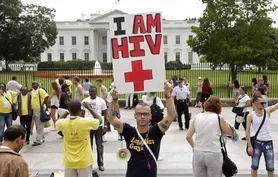
Biden pardons veterans convicted under military gay sex ban
Clip: 6/26/2024 | 5m 43sVideo has Closed Captions
Biden pardons veterans convicted under military's former ban on gay sex
President Biden announced pardons for former U.S. service members who were convicted under a military law, repealed in 2013, that banned gay sex. The move would potentially cover thousands of veterans who were forced out of the military because of their sexual orientation. Geoff Bennett discussed the decision with Lindsay Church, executive director of Minority Veterans of America.
Problems with Closed Captions? Closed Captioning Feedback
Problems with Closed Captions? Closed Captioning Feedback
Major corporate funding for the PBS News Hour is provided by BDO, BNSF, Consumer Cellular, American Cruise Lines, and Raymond James. Funding for the PBS NewsHour Weekend is provided by...

Biden pardons veterans convicted under military gay sex ban
Clip: 6/26/2024 | 5m 43sVideo has Closed Captions
President Biden announced pardons for former U.S. service members who were convicted under a military law, repealed in 2013, that banned gay sex. The move would potentially cover thousands of veterans who were forced out of the military because of their sexual orientation. Geoff Bennett discussed the decision with Lindsay Church, executive director of Minority Veterans of America.
Problems with Closed Captions? Closed Captioning Feedback
How to Watch PBS News Hour
PBS News Hour is available to stream on pbs.org and the free PBS App, available on iPhone, Apple TV, Android TV, Android smartphones, Amazon Fire TV, Amazon Fire Tablet, Roku, Samsung Smart TV, and Vizio.
Providing Support for PBS.org
Learn Moreabout PBS online sponsorshipGEOFF BENNETT: Major news from the White House today.
President Biden announced pardons for former U.S. service personnel who were convicted under a military law repealed in 2013 that banned gay sex.
The move today would potentially cover thousands of veterans who were forced out of the military because of their sexual orientation.
Lindsay Church is executive director of Minority Veterans of America and joins us now from the White House, where they are attending an event.
Thanks for being with us.
LINDSAY CHURCH, Executive Director and Co-Founder, Minority Veterans of America: Thank you so much for having me.
GEOFF BENNETT: Help us understand the details of this pardon, how it works and how it would affect veterans who were previously criminalized under the law.
LINDSAY CHURCH: So, today, the announcement was made that President Biden would use his clemency authority to pardon service members who received a discharge under what's called Article 125, which criminalizes gay sex, as you mentioned.
So folks that were kicked out and sent to court-martial based off of autonomy laws are -- now have the opportunity to apply to have that -- to have the pardon in that court-martial and to eventually have their discharges upgraded.
As you mentioned, this is expected that it could be up to a few thousand service members that were impacted by this.
The process would not be automatic.
The service member would still have to apply for the program under the pardon, and they would then go through the discharge upgrade process, but they would be entitled to -- as long as they meet the certain requirements, to be able to have their discharges upgraded to honorable, and which would allow them to be entitled to benefits that they have otherwise been denied for the last however long.
Sodomy laws were in place between 1951 and 2013, so many of these service members are long past, and their families will be able to apply for the benefits as well posthumously.
So they would have anything up to and including burial rights in National Cemetery.
GEOFF BENNETT: What about service members who were also discharged and criminalized in different ways, not under Article 125?
How does this apply to them, if at all?
LINDSAY CHURCH: It won't.
There is a very specific group of folks that are pardoned, that they're going to be specifically discharged under Article 125.
There are different programs that allow for people to apply for discharge upgrades should they have gone through or been discharged under what's called the don't ask/don't tell policy or for homosexual acts.
So there are processes in place in which that service member can apply for a discharge upgrade, and they can do that through the review boards for the military services.
So many of those service members are already eligible and have the ability to apply for the program.
But, like I said, one of the biggest problems with both of these programs is that they're not automatic.
And so it requires that the service member, former service member and their family actually apply for the clemency, so that they would actually -- it's not automatic and they wouldn't just automatically get it.
They would actually have to go through the process.
The VA issued a Web site today for anybody who is possibly entitled to the benefits of the clemency about Article 125, along with an FAQ section that says the criteria for which you would have to meet and the criteria in which you wouldn't apply -- or you wouldn't be able to meet the requirements for the program.
GEOFF BENNETT: Do you have a sense of why the Biden administration is making this move right now?
LINDSAY CHURCH: I think we're at a point where we are correcting past wrongs.
This -- like you mentioned, this -- sodomy laws were repealed in 2013.
It's now 2024.
It's been a decade, long past that we have been waiting for people to be able to access these benefits.
And, right now, obviously, it's Pride Month.
It's an opportunity for us to celebrate the accomplishment and to recognize that our country did a disservice to a generation of service members that were truly, truly criminalized for nothing more than their sexual orientation or gender identity.
And there's no one-size-fits-all solution to the people that were discharged under just -- under these policies.
And it's going to take small solutions like this for 2,000 service members at a time to reach the generation of service members like myself and those who served before 2011, when don't ask/don't tell was repealed.
GEOFF BENNETT: You served in the military for four years, as I understand it, most of those years under don't ask/don't tell.
What was that like for you?
LINDSAY CHURCH: I served all of three months under don't ask/don't tell.
And it was a really hard time.
You live under intense fear that you could wake up today and somebody would find out your secret, and you would go from being a linguist in the military to being dishonorably discharged and sent home with the equivalent of a felony on your record.
I spent a lot of time in the hospital because I got hurt in the military, spent 65 days in the hospital.
I couldn't have my partner with me.
I couldn't connect with the people that I needed to most, because the military, if they found out that I had a girlfriend or a partner back home, could potentially kick me out, and I would lose access to everything, including the health care that I desperately needed because of the injuries that I incurred in service.
So it was a very hard time, in which you spend all this time waiting and hoping that you aren't going to be next and picked out of a lineup for nothing more than just who you are.
Many of us served our country.
I'm transgender and very proudly served my country.
And one in five transgender Americans before the ban was lifted would serve in the military, which means that we're more patriotic as LGBTQ people.
We serve at twice the rate.
And we have lived under these criminal laws for a long time.
And so, little by little, we are working towards righting these wrongs.
But it's been a long process to get to a place of healing around that policy.
GEOFF BENNETT: Lindsay Church is executive director of Minority Veterans of America.
Thanks for being with us.
LINDSAY CHURCH: Thank you so much for having me.
The chances of a prisoner swap as Gershkovich's trial begins
Video has Closed Captions
Clip: 6/26/2024 | 9m 23s | As Gershkovich's trial begins, a look at the chances of a U.S.-Russia prisoner swap (9m 23s)
Christian communities face growing political divide
Video has Closed Captions
Clip: 6/26/2024 | 11m 48s | Christian communities face growing political divide as religious affiliation declines (11m 48s)
Draft opinion mistakenly posted by the Supreme Court
Video has Closed Captions
Clip: 6/26/2024 | 3m 37s | How a draft opinion on Idaho's abortion ban was mistakenly posted by the Supreme Court (3m 37s)
Experts provide insights on border situation ahead of debate
Video has Closed Captions
Clip: 6/26/2024 | 9m 27s | As immigration emerges as key election issue, experts provide insights on border situation (9m 27s)
New HIV shows promise in preventing infections in trials
Video has Closed Captions
Clip: 6/26/2024 | 6m 24s | New HIV drug taken twice a year shows promise in preventing infections in trials (6m 24s)
Providing Support for PBS.org
Learn Moreabout PBS online sponsorshipSupport for PBS provided by:
Major corporate funding for the PBS News Hour is provided by BDO, BNSF, Consumer Cellular, American Cruise Lines, and Raymond James. Funding for the PBS NewsHour Weekend is provided by...
